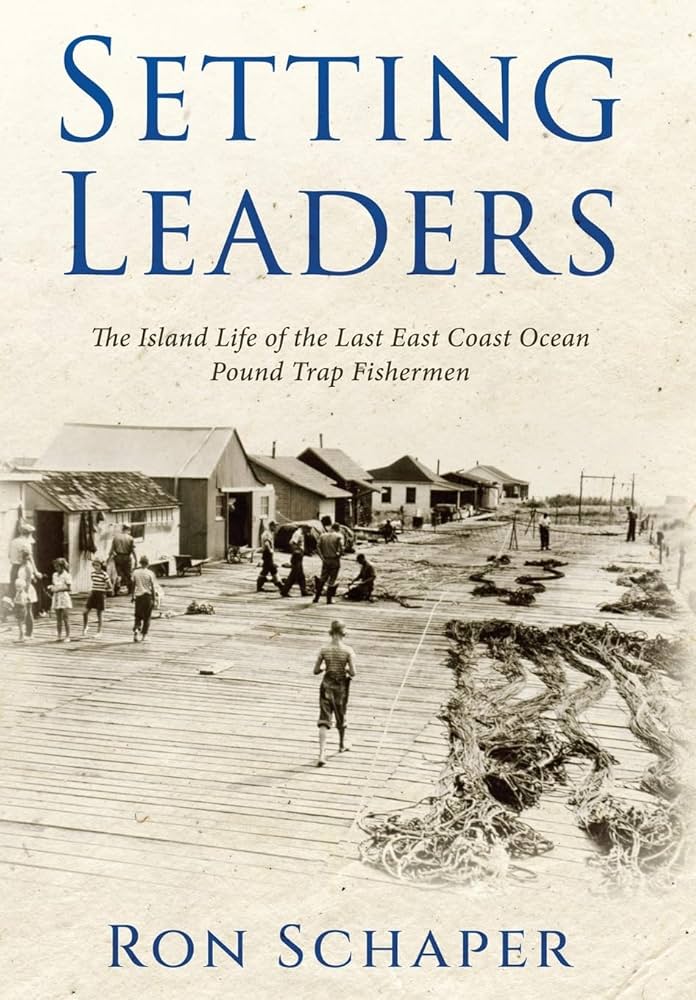Setting Leaders
The Island Life of the Last East Coast Ocean Pound Trap Fishermen
Memoir
by Ron Schaper
Distributed by Bublish
When I glanced at the above title, I thought, ‘oh, a book about developing leaders, setting goals for mentors, people in charge.’ I was wrong, but I was also right.
For generations, the Schaper family operated the Sunrise Fish Company and its ocean pound traps off the town of Islip, supplying local restaurants with fresh fish on a daily basis. As I read the memoir about the trap fishermen who worked for Ron Shaper’s dad, Captain Louis Schaper, I learned that it takes the same honesty, perseverance, and self-reliance to make a good all-around leader as it does to make top-notch trap fishermen setting leaders.
Son of a long line of men who put in 12-hour days and a “so-called half day on Saturday,” Schaper grew up with a fishline in hand. Spending summers on a small fish camp island near Captree, he writes:
The stiff wire handles of the wooden bushel basket dug deep into the soft handles of the 8-year-old schoolboy. Even though he carefully selected the light bedroom baskets loaded with bed linens, towels, blankets, and clothing, they were still a bit much to carry through the house to the garage, where his older brothers were packing them into the Ford station wagon…This twice-a-year migration was a lot of work and lugging, but as a kid, there was excitement in the air: we were moving to the beach!”
His memoir is a family affair, and his mom, Mary, also looks back on those years with fondness:
“Children of the fishermen who lived at the beach…never wanted to go ashore. They swam and clammed and rowed. They visited kids on the other islands, and never tired of playing in the sand, the water and in the net sheds. They put on skits for their families. The big event of the day was when the pound boat was seen coming around the bend from the inlet. The children would announce its coming all would go down the dock to meet it and see the catch of the day.”
A childhood so different from kids today, in love with the internet, comes to this reviewer’s mind.
Life on the sea required patience and know-how; sudden changes in the weather or tide could mean the difference between a rewarding day’s work or a wasted day. Never idle, when the men weren’t fishing, they maintained the materials needed to fish.
“Every square inch of the nets and the supporting lines were inspected and repaired as needed… in a blur of rapidly moving hands—until his razor-sharp, wooden handled pocket knife was whipped out to cut off the end of the twine.”
Not to mention the painting and drying, folding, and storage of the nets. And the net house itself, a “heady aroma of old copper paint, musty nets and ropes, sweat and the sea.”
Readers will learn how the men set traps, hoisted nets, washed, weighed, and counted the catch, put them in ice, and packed them (in 100-pound boxes, six to a pallet).
“The entire process; the swishing of buckets of seawater being drawn off the end of the dock, the fisherman’s glowing cigarettes, the blur of activity in the fish preparation, the shouts of playing children—all under the glow of the first net shed light…”
If you’re in the market for an engaging read about a way of life, you knew little or nothing of, where the author had a happy childhood and loved his parents and the life they provided him, “Setting Leaders” is your book. Well written, with vivid and sensory details, the author honors his family and generations of dedicated, hardworking men of the fishing industry.
A photo of his mother beside her 1939 Anderson stove that “produced thousands of blueberry pancakes and tons of bacon over the years” and family photos set against the sea at play and at work highlight the personal tone of the memoir.
You can take the man out of Long Island (he lives in Florida now) but you can’t take Long Island out of the man. Schaper is back where his family “still has beach houses on Havemeyer Island.” He’ll discuss his book at the Vanderbilt Museum in Centerport on September 19, 2024.




























